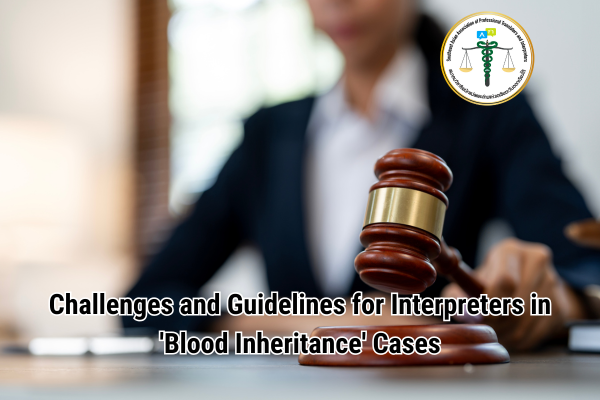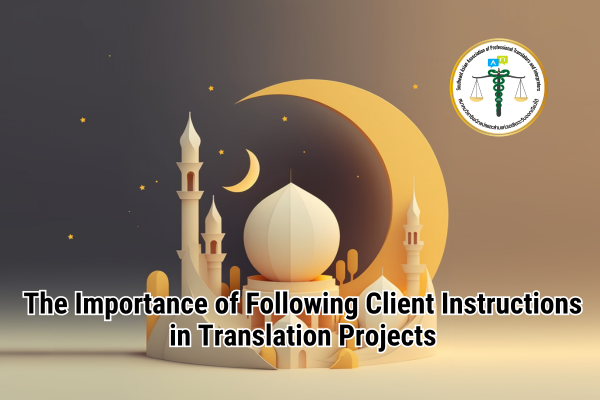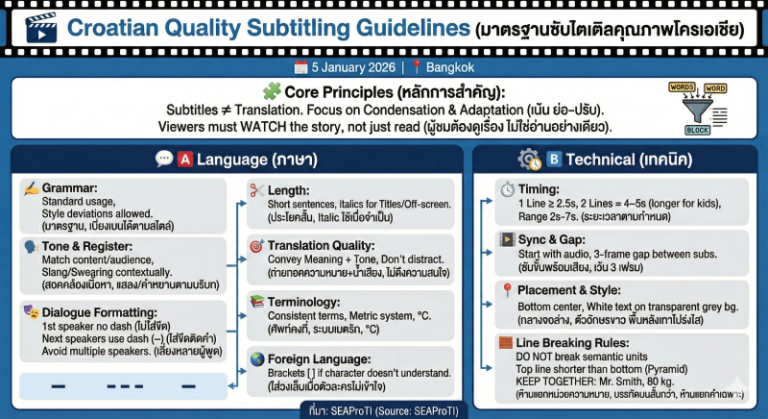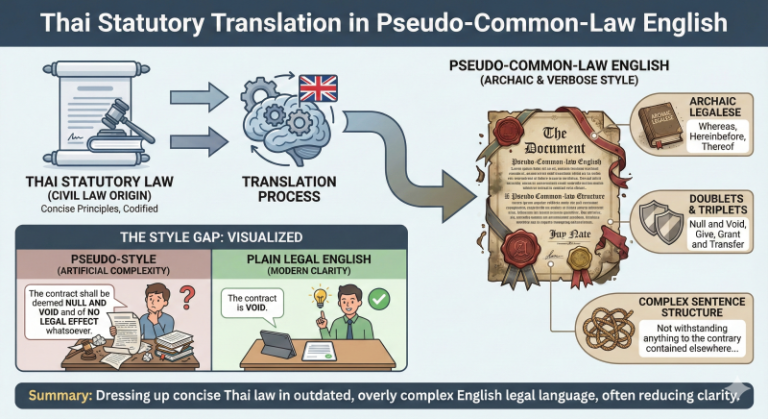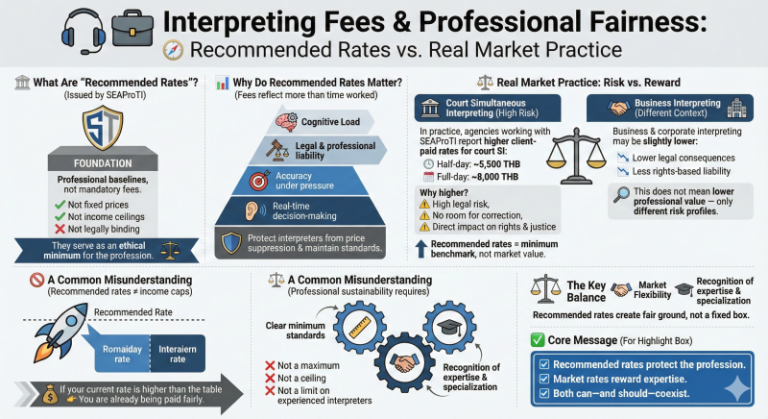Challenges and Guidelines for Interpreters in ‘Blood Inheritance’ Cases
30 January 2026, Bangkok – Cases involving ‘blood inheritance’ are among the most complex and emotionally charged legal disputes. These cases not only involve civil law regarding inheritance but may also extend into criminal law, such as fraud, document forgery, or even homicide. Given the high level of conflict, interpreters play a crucial role in ensuring accurate communication between parties. A single misinterpretation could affect legal rights and case outcomes significantly.
Challenges in Handling ‘Blood Inheritance’ Cases
1. Complex Legal Issues
Inheritance cases require an understanding of civil and commercial law related to inheritance. If crimes like murder or fraud are involved, criminal law also comes into play. Interpreters must be aware of key legal principles, such as unworthy heirs, and the legal conditions that may disqualify someone from receiving an inheritance.
2. Family Conflicts
Inheritance is a sensitive issue that can lead to family disputes. These cases often involve intense emotions, including resentment, betrayal, and financial interest. Interpreters frequently work in an environment where hostility and emotional tension are high, which can impact their ability to perform effectively if not managed properly.
3. Handling Legal Documents and Evidence
‘Blood inheritance’ cases often involve crucial documents such as wills, land title deeds, financial statements, and forensic evidence. If an interpreter lacks familiarity with these documents, errors in translation may lead to serious legal consequences.
4. Diverging Testimonies
Witnesses and involved parties may present conflicting testimonies. Interpreters must convey each statement accurately and impartially, avoiding any personal bias or misrepresentation.
5. Emotional Intensity and High Pressure
Interpreters working in these cases face immense stress due to the highly emotional nature of the proceedings. Harsh language, crying, and aggressive behavior from litigants are common, requiring interpreters to remain composed and professional at all times.
Guidelines for Interpreters in ‘Blood Inheritance’ Cases
1. Thoroughly Study Case Information and Relevant Laws
Interpreters must research case details, understand the relationships between involved parties, and familiarize themselves with inheritance law and related criminal statutes, such as document forgery and coercion.
2. Maintain Neutrality
Interpreters must accurately translate all statements without personal opinions or biases. Avoiding language that could influence legal proceedings is crucial to maintaining professional integrity.
3. Develop Emotional Resilience
Due to the heightened emotional environment, interpreters must be prepared to handle intense pressure without letting it affect their performance. Emotional intelligence and self-regulation are key skills in this role.
4. Master Legal Terminology
Interpreters must be well-versed in legal terminology related to inheritance, such as “will,” “estate succession,” and “executor.” If any terms are unclear, consulting with legal professionals beforehand is advisable.
5. Translate Accurately and Completely
All information must be translated as presented without omissions or alterations. This is especially critical in witness testimonies and defendant statements, as they directly impact court decisions.
6. Handle Strong Language with Precision
Inheritance disputes often involve harsh words, accusations, or even threats. Interpreters must convey these accurately while ensuring that their language aligns with courtroom decorum.
7. Prepare for Emergency Situations
In some cases, courtroom disputes may escalate into physical confrontations or extreme emotional reactions. Interpreters must remain composed and be prepared to inform court officials if intervention is necessary.
8. Coordinate with Relevant Authorities
Interpreters should work closely with lawyers, prosecutors, judges, and court officials to facilitate clear communication. If any legal processes are unclear, consulting with the appropriate personnel before translating is recommended.
Conclusion
‘Blood inheritance’ cases are legally and emotionally complex, requiring interpreters to have a strong grasp of legal principles, emotional resilience, and strict impartiality. Accurate and precise translation is essential in ensuring justice is served. Therefore, continuous training and preparation are crucial for interpreters working in the legal system professionally.
SEAProTI’s certified translators, translation certification providers, and certified interpreters:
The Southeast Asian Association of Professional Translators and Interpreters (SEAProTI) has officially announced the criteria and qualifications for individuals to register as “Certified Translators,” “Translation Certification Providers,” and “Certified Interpreters” under the association’s regulations. These guidelines are detailed in Sections 9 and 10 of the Royal Thai Government Gazette, issued by the Secretariat of the Cabinet under the Office of the Prime Minister of the Kingdom of Thailand, dated July 25, 2024, Volume 141, Part 66 Ng, Page 100.
To read the full publication, visit: the Royal Thai Government Gazette
ความท้าทายและแนวทางปฏิบัติหน้าที่ล่ามในคดี “มรดกเลือด”
30 มกราคม 2568, กรุงเทพมหานคร – คดี “มรดกเลือด” เป็นหนึ่งในคดีที่มีความซับซ้อนและเต็มไปด้วยอารมณ์ความรู้สึกของผู้เกี่ยวข้อง ทั้งทายาท คู่กรณี และบุคคลแวดล้อม คดีประเภทนี้ไม่เพียงแต่เกี่ยวข้องกับกฎหมายแพ่งว่าด้วยมรดก แต่ยังอาจพัวพันกับกฎหมายอาญา เช่น การฉ้อโกง การปลอมแปลงเอกสาร หรือแม้แต่คดีฆาตกรรม ความขัดแย้งที่เกิดขึ้นทำให้การปฏิบัติหน้าที่ของล่ามมีความสำคัญอย่างยิ่ง เพราะการแปลที่ผิดพลาดอาจส่งผลกระทบต่อคดีและสิทธิของผู้เกี่ยวข้อง
ความท้าทายในการทำคดี “มรดกเลือด”
1. ประเด็นทางกฎหมายที่ซับซ้อน
คดีมรดกเกี่ยวข้องกับการตีความกฎหมายแพ่งและพาณิชย์ว่าด้วยมรดก และหากมีการฆาตกรรมหรืออาชญากรรมที่เกี่ยวข้อง คดีจะถูกพิจารณาภายใต้กฎหมายอาญาด้วย ล่ามต้องเข้าใจประเด็นกฎหมาย เช่น ผู้รับมรดกไม่สมควร (Unworthy Heirs) และเงื่อนไขทางกฎหมายที่อาจทำให้บุคคลสูญเสียสิทธิในการรับมรดก
2. ความขัดแย้งภายในครอบครัว
มรดกเป็นเรื่องที่อ่อนไหวและอาจทำให้สมาชิกในครอบครัวแตกแยก หลายครั้งล่ามต้องทำงานท่ามกลางบรรยากาศที่เต็มไปด้วยความโกรธแค้นและความเครียดสูง อารมณ์ของคู่กรณีอาจปะทุขึ้นอย่างรุนแรง ซึ่งอาจส่งผลต่อการทำงานของล่ามหากไม่ได้เตรียมตัวรับมืออย่างเหมาะสม
3. การจัดการกับหลักฐานและเอกสารทางกฎหมาย
ในคดี “มรดกเลือด” มีหลักฐานที่เกี่ยวข้องจำนวนมาก ไม่ว่าจะเป็น พินัยกรรม โฉนดที่ดิน บัญชีทรัพย์สิน และหลักฐานทางนิติวิทยาศาสตร์ หากล่ามไม่มีความรู้ความเข้าใจเกี่ยวกับเอกสารเหล่านี้ อาจแปลผิดหรือคลาดเคลื่อน ซึ่งอาจส่งผลกระทบต่อรูปคดี
4. การให้ปากคำที่แตกต่างกัน
พยานและผู้เกี่ยวข้องในคดีอาจให้ข้อมูลที่แตกต่างหรือขัดแย้งกัน ล่ามต้องสามารถถ่ายทอดคำพูดของแต่ละฝ่ายได้อย่างแม่นยำและเป็นกลาง โดยไม่ให้ความเห็นส่วนตัวหรือบิดเบือนข้อมูล
5. อารมณ์ของผู้เกี่ยวข้องและความกดดันสูง
ล่ามต้องเผชิญกับความเครียดสูง เนื่องจากการพิจารณาคดีประเภทนี้อาจมีการใช้คำพูดที่รุนแรง มีการร้องไห้ หรือมีพฤติกรรมก้าวร้าวจากฝ่ายใดฝ่ายหนึ่ง ล่ามต้องมีความสามารถในการควบคุมอารมณ์และปฏิบัติหน้าที่อย่างมืออาชีพ
แนวทางในการปฏิบัติหน้าที่ล่ามในคดีมรดกเลือด
1. ศึกษาข้อมูลคดีและกฎหมายที่เกี่ยวข้อง
ล่ามต้องศึกษาข้อมูลคดีล่วงหน้า ทำความเข้าใจโครงสร้างความสัมพันธ์ของผู้เกี่ยวข้อง และทำความเข้าใจกฎหมายมรดก รวมถึงกฎหมายอาญาที่เกี่ยวข้อง เช่น การปลอมแปลงพินัยกรรม หรือการใช้กำลังเพื่อแย่งชิงมรดก
2. รักษาความเป็นกลาง
ล่ามต้องแปลคำพูดตามความเป็นจริง โดยไม่ลำเอียงหรือแสดงความเห็นส่วนตัว หลีกเลี่ยงการใช้ถ้อยคำที่อาจส่งผลต่อรูปคดี และรักษาจรรยาบรรณของวิชาชีพ
3. ฝึกฝนการจัดการอารมณ์
คดีลักษณะนี้เต็มไปด้วยอารมณ์ความรู้สึก ล่ามต้องสามารถรับมือกับแรงกดดันและอารมณ์ที่รุนแรงของคู่กรณีได้ โดยไม่ปล่อยให้อารมณ์ของผู้อื่นมีผลกระทบต่อการทำงานของตน
4. เตรียมความพร้อมด้านคำศัพท์กฎหมาย
ล่ามต้องมีความเชี่ยวชาญด้านศัพท์กฎหมายที่เกี่ยวข้องกับคดีมรดก เช่น “พินัยกรรม” “มรดกตกทอด” “ผู้จัดการมรดก” และศัพท์ที่เกี่ยวข้องกับคดีอาญา หากมีข้อสงสัยควรศึกษาล่วงหน้าหรือสอบถามจากทนายความที่เกี่ยวข้อง
5. แปลอย่างแม่นยำและครบถ้วน
ล่ามต้องแปลข้อมูลทุกอย่างตามต้นฉบับ ห้ามตัดทอนหรือเพิ่มเติมข้อมูลที่อาจทำให้เกิดความเข้าใจผิด โดยเฉพาะเมื่อแปลคำให้การของพยานหรือจำเลย ซึ่งเป็นข้อมูลสำคัญที่ศาลจะใช้พิจารณาคดี
6. รับมือกับคำพูดที่มีอารมณ์รุนแรง
หากมีการใช้คำพูดที่รุนแรงหรือหยาบคายในศาล ล่ามต้องแปลให้ครบถ้วนตามจริง โดยอาจใช้ภาษาที่เหมาะสมกับบริบทของศาล และต้องไม่ลดทอนความหมายของคำพูดนั้น
7. เตรียมพร้อมรับสถานการณ์ฉุกเฉิน
ในบางกรณี อาจเกิดเหตุการณ์ทะเลาะวิวาทในศาล หรือผู้เกี่ยวข้องเกิดภาวะเครียดจนเป็นลม ล่ามต้องมีสติและรู้วิธีจัดการกับสถานการณ์ฉุกเฉิน เช่น แจ้งเจ้าหน้าที่ศาลให้เข้ามาดูแล
8. ทำงานประสานกับเจ้าหน้าที่ที่เกี่ยวข้อง
ล่ามควรทำงานร่วมกับ ทนาย อัยการ ผู้พิพากษา และเจ้าหน้าที่ศาล เพื่อให้การสื่อสารเป็นไปอย่างราบรื่น หากมีข้อสงสัยเกี่ยวกับกระบวนการพิจารณาคดี ควรขอคำแนะนำจากเจ้าหน้าที่ก่อนการแปล
สรุป
คดี “มรดกเลือด” เป็นคดีที่มีความซับซ้อนสูงและเต็มไปด้วยความขัดแย้งทางกฎหมายและอารมณ์ของผู้เกี่ยวข้อง ล่ามที่ทำงานในคดีนี้ต้องมี ความเชี่ยวชาญด้านกฎหมาย ความสามารถในการจัดการอารมณ์ และความเป็นกลางอย่างเคร่งครัด การแปลที่แม่นยำและครบถ้วนมีผลโดยตรงต่อความยุติธรรมในคดี ดังนั้น การเตรียมความพร้อมและการฝึกฝนทักษะที่เกี่ยวข้องจึงเป็นสิ่งจำเป็นสำหรับล่ามที่ต้องการทำงานในกระบวนการยุติธรรมอย่างมืออาชีพ
เกี่ยวกับนักแปลรับรอง ผู้รับรองการแปล และล่ามรับรองของสมาคมวิชาชีพนักแปลและล่ามแห่งเอเชียตะวันออกเฉียงใต้
สมาคมวิชาชีพนักแปลและล่ามแห่งเอเชียตะวันออกเฉียงใต้ (SEAProTI) ได้ประกาศหลักเกณฑ์และคุณสมบัติผู้ที่ขึ้นทะเบียนเป็น “นักแปลรับรอง (Certified Translators) และผู้รับรองการแปล (Translation Certification Providers) และล่ามรับรอง (Certified Interpreters)” ของสมาคม หมวดที่ 9 และหมวดที่ 10 ในราชกิจจานุเบกษา ของสำนักเลขาธิการคณะรัฐมนตรี ในสำนักนายกรัฐมนตรี แห่งราชอาณาจักรไทย ลงวันที่ 25 ก.ค. 2567 เล่มที่ 141 ตอนที่ 66 ง หน้า 100 อ่านฉบับเต็มได้ที่: นักแปลรับรอง ผู้รับรองการแปล และล่ามรับรอง


